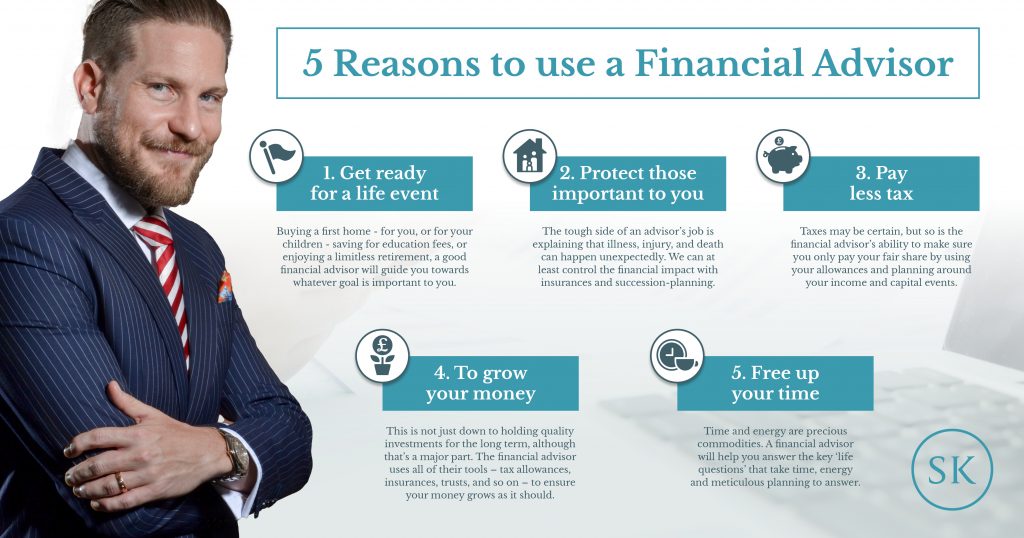Knowing why and when to use a financial advisor can be difficult. Many people wait until they have become wealthy to get advice and come into money, often through inheritance or the sale of a business. But there are many more everyday reasons to bring in the support of a professional financial advisor.
Wealth is a subjective word. Your definition may be very different from mine – and we could both be right. It is better to let your decision to speak to an advisor be because you have a financial aspiration or goal that you would like help achieving.
Aspirations can range from highly specific – “I want to invest $250,000 in a business in 5 years” – to vague – “I’d like to be wealthier”, or, “I want to worry less about money”.
There are hundreds of reasons to opt to use a financial advisor, but most of them can be related to one of this list of five.
Life comes at us at a faster pace than we bargain for sometimes, but growing your money doesn’t happen overnight. So, it often pays to plan well in advance. Buying a first home (for you, or for your children), saving for school or university fees, or enjoying a limitless retirement are common events.
A good financial advisor will guide you towards whatever event is important to you by making a plan to take you from your current position to that objective with the right investments.
The financial advisor has a wide range of tools to support you in financially protecting your family.
Life insurance is perhaps the most well-known and is a policy which will pay cash benefits either to replace an income or to pay for a house should the insured person (or people) die. Should you become seriously ill, a cash payout from a critical illness policy would be a huge help in difficult times.
Any illness or condition that prevents you from working can be protected against by taking out income protection – an excellent financial solution which replaces a large part of your income while you can’t work.
The risks of not taking advice when it comes to insurance are that you end up paying more than you have to for policies that don’t cover you for what you thought, or for as much as you thought. A professional financial advisor will tailor the policy to your exact needs and explain to you exactly what you’re signing up for.
Protection doesn’t stop with insurance, either. Inheritance tax planning will mean as much of your wealth passes to the people you want to pass it to as possible. Trusts are one way of ensuring it is only used for the right reasons, even after you have legally given it away.
If you opt to use a financial advisor, they will talk to you about tax, to make sure you’re not paying more than you need to.
Done properly this doesn’t involve any financial black magic. Just to check that you’re using all of the allowances available to you wherever you are a resident. Tax-efficient wrappers and products are perfectly legal and are set up by governments to encourage certain investment behaviours. Minimising your tax burden can be an enormous advantage over the long term because taxes can limit your investment growth.
The sheer choice when it comes to investments means it’s a great help to be able to speak to a professional who understands the marketplace, who the good fund managers are, and how to navigate the economic ups and downs.
Any investor with patience has what Einstein called the 8th wonder of the world at their disposal – compound interest. Your returns, if retained, will generate more returns. The effect starts slow (this is when your advisor will help you focus on the long term) but gains more and more momentum as the year's pass. When done right, investing is the difference between being affluent and not.
Growing your money isn’t just down to the investments you hold. It’s everything that comes in the financial advisor’s tool bag, like the tax planning mentioned earlier. And what good is an investment strategy if you can’t work, have no insurance, and have to draw on your capital to make ends meet?
When appointing a financial advisor, you’re bringing in someone to do your planning and your worrying for you. Answering questions like “when can I retire?”, “how much do I need to save each month to buy my forever home?” and “what life insurance policy do I really need?” all take time and energy, two very precious commodities. They will provide you with an objective view, taking emotion out of the planning.
It's rarely not a good time to speak to a financial advisor, the benefits just from having had the conversation are significant, but the long-term effects are often life-changing.

If you’d like to discuss this article in more detail or to find out more about how I can support you with your financial goals, please feel free to get in touch - it won’t cost you anything to speak to me.